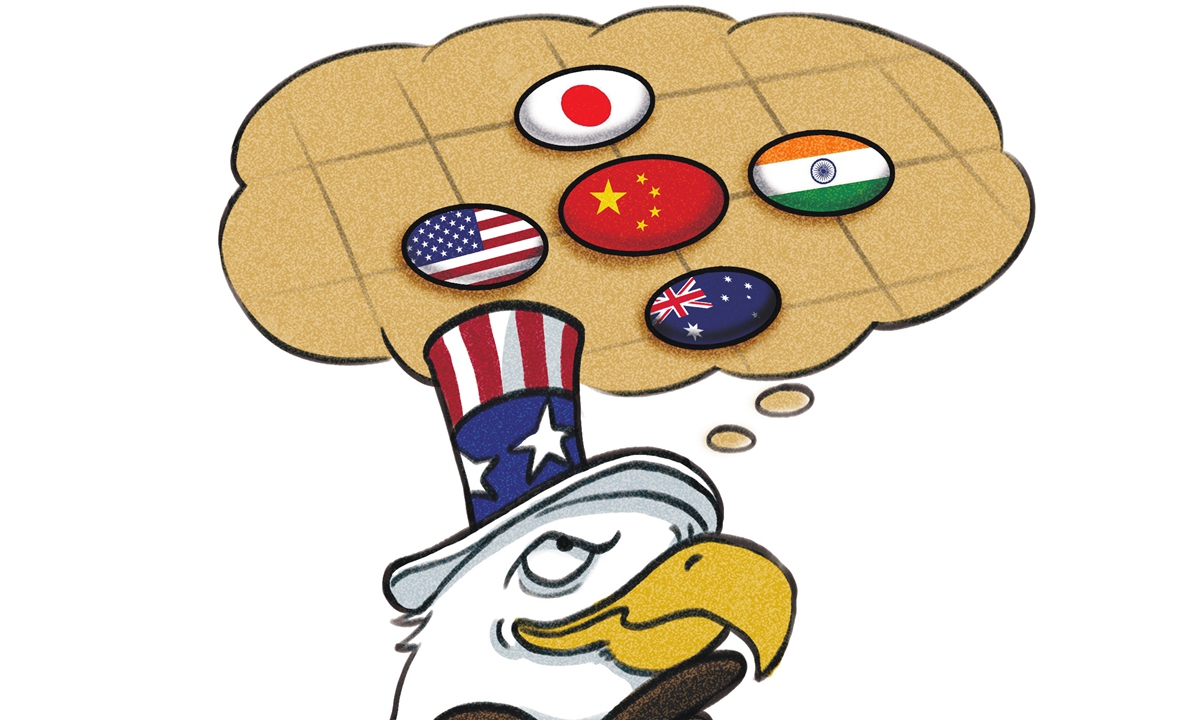‘Quad’ gears up but should mind perils
By Zhang Tengjun Source: Global Times Published: 2020/9/2 20:13:40

Illustration: Liu Rui/GT
The US plans high-level talks with "Quad" security partners from India, Australia and Japan in September and October, US President Donald Trump's national security adviser Robert O'Brien said Friday in a speech delivered at the Atlantic Council think tank. As the presidential election approaches, the US intends to accelerate the construction of the Quad security grouping. Recent months have seen frequent interactions among the Quad countries to strengthen collaboration. They are actively making preparations for establishing a broader strategic alliance.For instance, India and Australia in early June announced a comprehensive strategic partnership. This led to an agreement between New Delhi and Canberra for closer defense and maritime security cooperation, as well as access to the other's military bases to facilitate mutual defense exchanges and exercises. New Delhi and Washington will be holding their first virtual 2+2 format dialogue with both foreign and defense ministries in September, during which the two sides might finally sign the Basic Exchange and Cooperation Agreement. The agreement will enable exchanges of geospatial intelligence between the two countries. The signing of these pacts will mean a military version of the Quad grouping is getting ready to take shape.
As the leader of the Quad grouping, the US has in recent months held multiple bilateral and multilateral exercises with Japan and Australia in the South China Sea. Washington also carried out dual carrier operations in the South China Sea with an eye to deter China. The US has publicly rejected most of China's maritime claims in the South China Sea, and is pressing Australia to increase freedom of navigation exercises there too. When it comes to the China-India border standoff, Washington has unjustly taken India's side and groundlessly criticized China.
The idea of Quad was proposed long ago. However, it has faced challenges of threat perception, strategic culture, military capabilities, and costs. Combined these led the concept to stagnate. After the Trump administration assumed power, the US put forward its Indo-Pacific Strategy in an attempt to enhance its military presence and maintain its dominant position in the Indo-Pacific region by strengthening the regional security cooperation network. Constructing the Quad is now seminal to this strategy.
Amid increasing demands to vie for regional influence and concerns over China's rise and expanding influence, major countries such as the US, Japan, India and Australia have quickened their pace of cooperation. Impacted by the COVID-19 pandemic, India, Japan and Australia plan to launch an initiative to build resilient supply chains in the Indo-Pacific region in order to reduce dependence on China.
The four Quad countries claim their military and economic measures are aimed at maintaining balances of power and rule-based regional order. But in fact, the Quad grouping is an ideological camp similar to the one during the Cold War. It seeks to contain China.
The US, as the biggest promoter, has intensified its actions to formalize the Quad grouping for at least two purposes. First, Washington aims to cater to China hawks and conservative voters by hyping up the situation in the West Pacific. The US will even trigger friction between China and any one of the Quad countries to slander China as a destroyer of regional order. For Trump administration, if some accidents happen it can gain profits from regional tensions and maximize self interests. Meanwhile, the collective action of the four Quad countries can also demonstrate US regional leadership and enhance its reputation among allies.
Second, deepening cooperation among Quad countries means major arms deals will go down with potential economic benefits. The US will naturally be the biggest beneficiary of this.
If Japan, Australia and India totally follow the US' lead, the US will take the opportunity to get more deeply involved in regional affairs. This will allow it to further strengthen its regional military presence and realize its pivot to the Asia-Pacific in a true sense. It's also in line with the US' strategic interests for the three countries to engage in economic decoupling from China.
As Tokyo, Canberra and New Delhi have increasingly viewed their relations with China from the perspective of competition and prevention, this will certainly advance the Quad.
Countries within and outside the region who seek to counterbalance, contain or and even suppress a regional power by forming an alliance seem to follow the history from the last century. But this is exactly what is happening today.
However, the geopolitical competition and confrontation should not become the main theme of the Asia-Pacific. For influential regional powers, the best foreign policy for them is to pursue independence. Blindly following a super power and turning themselves into its accomplices and pawns will only jeopardize their own national interests. Before joining the US' anti-China coalition, relevant countries should seriously mull over one question: Is it a blessing or a curse for regional peace and stability?
The author is an assistant research fellow at the China Institute of International Studies. opinion@globaltimes.com.cn
Posted in: ASIAN REVIEW